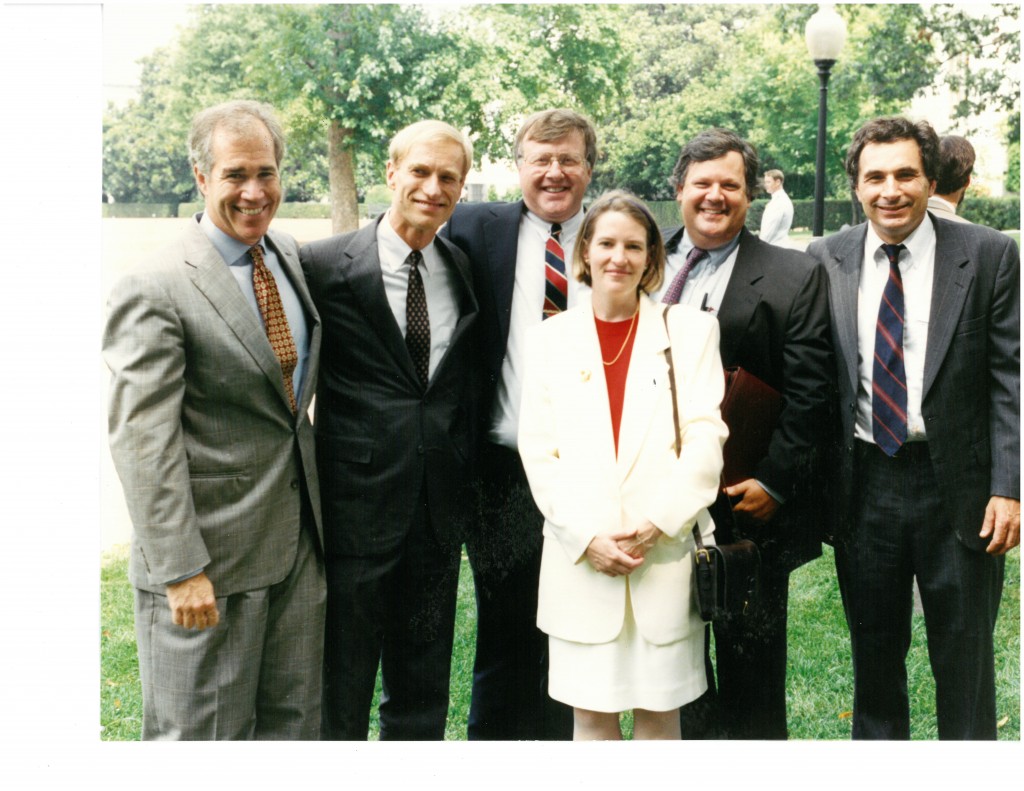Post written by Bob Rapoza
A celebration of a retiring leader in the CDC community was held this week. My good friend, Ron Phillips, the founder and president of Coastal Enterprises, Inc. is retiring. While I was not able to attend Ron’s celebration in Maine, I knew it would be quite an event, and a fitting tribute to all the good work done by a great organization and its leader. As such, I want to add a comment about my work with Ron and the Eagles and take this opportunity to put our efforts in perspective.
Ron was part of a generation of CDC leaders that came of (political) age in the late 1970s to early 1980s. The group included David Lizarraga, Jim Dowdy, Don Maxwell, Dennis West, Steve McConnell, Pete Garcia, Perry Eaton and Bill Duncan. All had been involved in various ways in the OEO Title VII CDC program. That program was, of course, eliminated by the Reagan Administration in favor of the much smaller Community Economic Development grant program at HHS. However, this much diminished program – $17 million in 1982 – was the only source of funding available to CDCs for community economic development.
Despite this setback, these CDC leaders formed what we now refer to as the Eagles – a group of 15 or so CDCs that was originally organized to try to support the HHS program and develop cooperative agreements with other federal agencies. The purpose of the group was to find a strategy to build federal resources for CDCs. Side note: the group was christened the “Eagles” by Perry Eaton, the only member of the group to admit to being a Republican. The Reagan fundraising operation had dubbed their biggest givers as Eagles. Perry thought it was a perfect name and it stuck. Over the years, the group had many new recruits including Mary Nelson, John MacDonald, Jerry Rickett, Ray Moncrief, Arlen Kangas, Steve Fairfield, the late Karl Pnazek, Bill Bay, Howard Snyder, Bill Linder, the late Harry Bowie, the late Nick Smith, Lee Beaulac, Kerry Doi, Roberto Barragán and a number of their successors.
Beginning in March 1987, through meetings at TELACU House in Dupont Circle, we hashed out plans: look for targets of opportunity within federal agencies – there were not many – after all this was the Reagan Administration and in Congress, which was much more interesting. In the early years, we succeeded in getting CDC demonstrations on a trade bill, a workforce bill, working with Senator Mitchell on welfare reform and enacted the JOLI program and in the 1993 Budget Reconciliation Bill – the CDC Tax Credit.

We also laid the groundwork for enduring and successful programs: at SBA with the micro loan program; at USDA with rural development loan and grant programs; and we have maintained the CED program at HHS all of these years. The success of the CDC Tax Credit paved the way for meeting at the White House and Treasury and then a series of late night negotiations with the Clinton Administration officials on the design of a new tax credit for community development – the New Markets Tax Credit (NMTC). The NMTC has greatly enhanced the impact of many CDCs, including CEI, and has open the door to many new relationships for CDCs. In fact, the NMTC stands as the largest new federal community development program in more than 20 years.
We accomplished this by bringing the CDCs to Washington to translate their local success stories into public policy. Over the years, in various combinations, the Eagles would troop around Capitol Hill or to federal agencies. Ron was almost always there, carrying with him not only his message of success from Maine, but also his low key and persistent advocacy on doing more for people and communities. Ron always – cue his colleagues rolling their eyes—had his CEI swag: cardboard lobsters, lip lube, and clam chowder.
The CDC group that Ron helped established 29 years ago has a lot to look back on with pride. The group never had a chairperson, never kept minutes, and never had a budget to speak of. It was all about increasing resources for communities and people. It is a tribute to all the Eagles that the field of community economic development has come so far. As in Maine, Ron was a leader in Washington, and much of the success of the Eagles is a result of his efforts.
Finally, thank you to my friend Ron. For your leadership in the CDC movement, for the legacy you are leaving to the community development industry, and even for the cardboard “lobstahs” you brought to our meetings. You have made an indelible impact and the CDCs appreciate your dedication and work.

